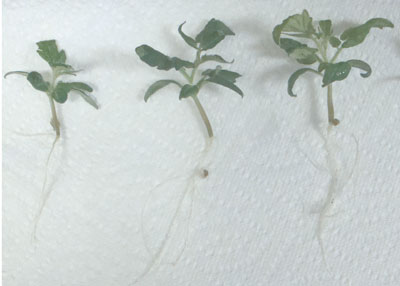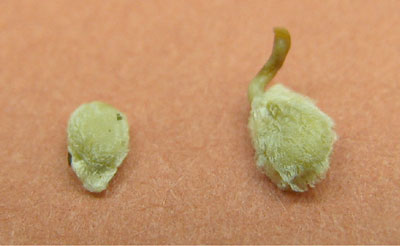| Posted: Sep 29, 2009 | |
Nanotechnology dramatically affects plant growth |
|
| (Nanowerk Spotlight) To what degree nanoparticles are uptaken by plants and what their effect is on plant development is an important issue in determining the environmental impact of nanomaterials. Previously we have covered several research projects that have begun to explore nanotechnology's impact on major food crops and some of them have demonstrated quite a negative impact (see for instance "Nanoparticle uptake by plants"). But some research results also show a possible positive effect, like a recent study that demonstrates that carbon nanotubes (CNTs) can dramatically accelerate the germination and growth of tomato seeds. Work like this contributes to an important body of interdisciplinary research where nanotechnology, plant biology and biotechnology converge to open new perspectives for solving some of the important challenges of our times such as increased food and biofuel production. | |
| "We feel that the results that we have observed are very important for both areas of plant biology and nanotechnology," Mariya Khodakovskaya and Alexandru Biris tell Nanowerk. "The fact that nanomaterials have a strong influence on the growth kinetics of the plants is a clear indication of the bio-activity of these nanomaterials. Such dramatic increase of a plant's bio-mass can definitely be used for the creation of smart fertilizers for bio-fuel plants. It is also possible, although we have not demonstrated it, that the plants treated with nanomaterials can be grown in various conditions of humidity." | |
 |
|
| Phenotypes of 30-day-old tomato seedlings growing on medium without (left) and with CNTs (middle and right). | |
| Reporting their findings in the September 22, 2009 online edition of ACS Nano ("Carbon Nanotubes Are Able To Penetrate Plant Seed Coat and Dramatically Affect Seed Germination and Plant Growth"), the two University of Arkansas professors and their team have demonstrated that carbon nanotubes can penetrate thick seed coat and support water uptake inside tomato seeds. | |
| "The activated process of water uptake could be responsible for the significantly faster germination rates and higher biomass production for the seeds and seedlings that were exposed to carbon nanotubes, although the exact molecular mechanisms of CNT-induced water uptake inside plants seeds are not clear yet and require further investigation," says Khodakovskaya, an assistant professor for plant biology. | |
| In their experiments, the researchers first sterilized tomato seeds and then placed them in growth medium without or with multi-walled CNTs (with a purity of >98% and at concentrations between 10 and 40 µg per mL) for germination. They found that the germination percentage rates were dramatically higher for seeds that were treated with CNTs. The germination percentage for seeds that were placed on regular medium (without CNTs) averaged 32% in 12 days and 71% in 20 days, while germination percentage of the seeds placed on medium supplemented with CNTs averaged 74-82% in 12 days and 90% in 20 days. | |
 |
|
| Phenotype of tomato seeds incubated during 3 days without (left) or with (right) CNTs on standard agar Murashige and Skoog medium. (Reprinted with permission from American Chemical Society) | |
| Of course, the data presented by Khodakovskaya and Biris require further studies using genomic, proteomic and metabolomic approaches to fully understand the real implications of these results. While it is clear that the nanotubes do play a role in the development of plants, a major issue that has to be fully studied is the potential toxic effect of the CNTs when they are delivered in really large amounts to the plants. | |
| Khodakovskaya notes that at the moment it is not known where exactly the CNTs distribute in the plants and especially the time that it takes for them to migrate from one part of the plant (roots) to another (fruits), or if this happens at all. | |
| "Also we believe that the effects presented in our study are dependant upon the type of plants used and on the particular environmental conditions" she says. "Another question that needs to be addressed is if possibly the nanomaterials can be uptaken from soil, reach the fruits and eventually be delivered into humans." | |
| Accelerated plant germination and increased plant biomass are desirable traits with high economic importance. For example, activation of seed germination under stress conditions, including water deficit stress, can open new opportunities to growing plants under these stress conditions, including drought and desert environments. Also, there is a considerable industrial interest in finding solutions to significantly increase the biomass of non-food crops for instance for biofuel production or as raw material for bio-polymers and fabrics or pharmaceutical proteins. | |
| If researchers can successfully demonstrate that they can devise a way to significantly increase plant growth with carbon nanotubes without detrimental environmental and health impacts, then the positive effect of CNTs on the seed germination could have significant economic importance for agriculture, horticulture, and the energy sector. | |
 By
Michael
Berger
– Michael is author of three books by the Royal Society of Chemistry:
Nano-Society: Pushing the Boundaries of Technology,
Nanotechnology: The Future is Tiny, and
Nanoengineering: The Skills and Tools Making Technology Invisible
Copyright ©
Nanowerk LLC
By
Michael
Berger
– Michael is author of three books by the Royal Society of Chemistry:
Nano-Society: Pushing the Boundaries of Technology,
Nanotechnology: The Future is Tiny, and
Nanoengineering: The Skills and Tools Making Technology Invisible
Copyright ©
Nanowerk LLC
|
|
|
Become a Spotlight guest author! Join our large and growing group of guest contributors. Have you just published a scientific paper or have other exciting developments to share with the nanotechnology community? Here is how to publish on nanowerk.com. |
|
